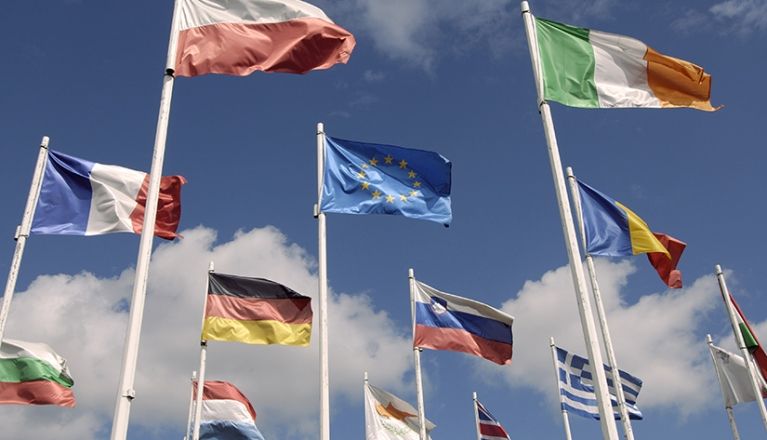-
View article
 #Economy
#EconomySouth Korea: a year after the political crisis, markets are buying the promise of stability
2025/12/17
- #Eco-trends
- 2020/04/20
- 0
-
9
European solidarity: impossible, conditional or unconditional?
Will the actions of the European Union (EU) be enough to demonstrate effective European solidarity? Is there a chance that history could repeat itself, with the EU doing too little, too late? There are, of course, political issues, but there are also legal issues that cannot be ignored. Looking at legal precedent in the eurozone case law can help us gain a better understanding of these issues. However, to be sure of taking the right legal path, it is vital to analyse the true nature of this crisis and how it differs from the last crisis.

An at-fault crisis: highly conditional solidarity
The eurozone’s institutions and instruments for preventing and resolving crises, constructed after the great economic and financial crisis of 2008, are rooted in a particular narrative concerning the origins of the crisis. Having committed the “fault” of allowing private and public sector debt to build up, some countries needed to be placed under supervision by their creditors to make sure they adopted the right behaviours, thus ensuring the funds loaned to them would be repaid and past mistakes would not be repeated.
For the past decade, this narrative has hinged around Articles 123* and 125** of the Treaty on the Functioning of the European Union (TFEU), introduced by the Maastricht Treaty. These two articles, known as “no bailout clauses”, remind us that neither the European Central Bank nor any Member State can take on the debt of another Member State. But was it the founding fathers’ intention to map out a Europe where the only possible form of solidarity was that resulting from redistribution via the EU budget?
The answer is clearly no! This does not mean the Union and its Member States are prohibited from granting any form of financial assistance to another Member State. All it means is that there is a need to highlight the exceptional nature of financial assistance to countries in crisis, and the constraints placed upon such assistance to ensure that Member States remain subject to market forces when they issue debt, thus encouraging them to maintain fiscal discipline. This is how the Member States were free to introduce a stability mechanism like the European Stability Mechanism*** (ESM), introduced in 2012 to help meet Member States’ funding requirements in an environment of financial instability. Such a mechanism could be created as long as it operated in a way that abided by EU law, notably as regards coordination of Member States’ economic policies. The rationale underpinning the ESM is clearly that such solidarity must come with strict conditions on the economic policies implemented by countries benefitting from its assistance. This means those countries must give up a portion of their (previously poorly exercised) sovereignty to virtuous creditors.
Although its purpose is clearly to ensure that countries’ economic policies are properly coordinated, this conditionality has not been submitted to sufficient debate and challenge. The relevance and effectiveness of the economic policies that inspired it have not been adequately reviewed and evaluated. This kind of debate should have been had ahead of time; not all of Europe’s citizens have seen the urgency and conditionality of the assistance provided as completely legitimate. The decade that has elapsed since the crisis has certainly cast doubt on their relevance, but insufficient effort has been made to engage in the kind of detailed debate that could have resulted in a new economic policy framework ready to be mobilised when the next crisis struck.
On this specific issue of the relevance of this form of conditionality used in the past, with Europe now hit by this new crisis, the fault line between countries is appearing. Just when the most difficult decisions need to be made, the time needed to agree on a new economic policy framework and ensure its democratic legitimacy is sorely lacking. This is why some countries are refusing to agree to the ESM being used as an instrument to help resolve the crisis.
No-fault crisis: unconditional solidarity
Before Articles 123 and 125, the founding fathers wrote Article 122 into the TFEU. This article stipulates that “Where a Member State is in difficulties or is seriously threatened with severe difficulties caused by natural disasters or exceptional occurrences beyond its control, the Council, on a proposal from the Commission, may grant, under certain conditions, Union financial assistance to the Member State concerned. The President of the Council shall inform the European Parliament of the decision taken.” These few lines cover all the bases, from the triggering event to the process for securing democratic legitimacy through the EU’s institutional triangle (the European Commission, European Council and European Parliament). Furthermore, case law at the Court of Justice of the European Union**** (CJEU) recognises that the existence of the ESM does not affect the exercise by the Union of the authority granted to it by Article 122 and that the two mechanisms can therefore coexist, corresponding to two different lines of approach.
It is on this basis that the Commission has proposed the SURE instrument (Support to mitigate Unemployment Risks in an Emergency). France’s proposal of a Recovery Fund to prepare for and support the post-crisis phase is also built on this foundation. This would be a temporary, targeted fund proportionate to the extraordinary costs resulting from the current crisis. In this environment, where the heavy cost of a crisis for which no country is at fault must be spread over time, there is no place for strict conditionality. The advantage of the SURE instrument is precisely that it refers not to the overall fiscal policy of countries affected by the pandemic but rather to specific financial needs triggered by the pandemic. It thus falls outside the scope of moral hazard and carries no risk of incentivising bad policy.
In the context of Article 122, Union financial assistance takes the form of a loan or credit facility granted to the Member State in question. The European Commission borrows the amount in question following a qualified majority decision by the Council.
However, the EU’s ability to issue bonds is a highly controversial issue. The EU budget may not be financed through bonds; it may only be financed from the EU’s own funds. For the SURE programme, the Commission therefore decided to treat the State guarantees underpinning its borrowing capacity as external assigned revenue, with an uncertain budgetary status or alongside the EU budget – something not every country might be happy with. Meanwhile, the proposed Recovery Plan involves a new intergovernmental agreement to create a new fund outside the Commission’s budget whose borrowing capacity would be guaranteed by the EU budget.
In any event, the Council qualified majority laid down Article 122 will not be sufficient to approve the Plan. A number of countries’ constitutional laws require that any budgetary expenditure or guarantee be approved by national parliaments. Unanimous agreement will therefore be necessary. The financing of such a vital programme must comply with legal requirements and not be unnecessarily open to attack and subject to the uncertainty of recourse to different constitutional jurisdictions, whether national or EU-wide.
Going beyond the approach based on intergovernmental agreements established as long ago as 2011 and returning to a purely EU-based framework will be no easy task.
The heated debate that has engulfed these proposals is thus nothing more than a foretaste of the conflict over resource distribution that awaits the European Union – and others – once the pandemic has passed.
* “Overdraft facilities or any other type of credit facility with the European Central Bank or with the central banks of the Member States […] in favour of [other] Member States shall be prohibited, as shall the purchase directly from them by the European Central Bank or national central banks of debt instruments.”
** “The Union shall not be liable for or assume the commitments of […] any Member State, without prejudice to mutual financial guarantees for the joint execution of a specific project. A Member State shall not be liable for or assume the commitments of […] another Member State […].”
*** “The Member States whose currency is the euro may establish a stability mechanism to be activated if indispensable to safeguard the stability of the euro area as a whole. The granting of any required financial assistance under the mechanism will be made subject to strict conditionality”.
**** Judgment of the Court (Full Court), 27 November 2012: Thomas Pringle v. Government of Ireland and Others.
Paola Monperrus-Veroni - Paola.monperrus-veroni@credit-agricole-sa.fr








